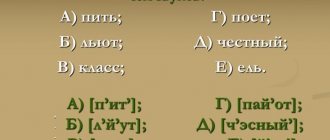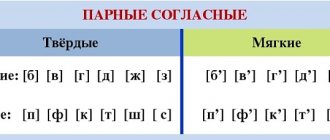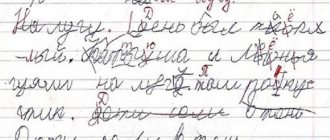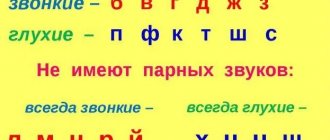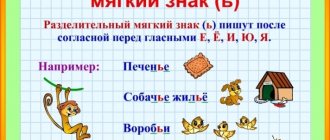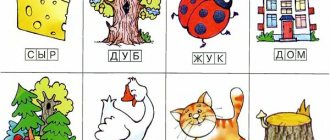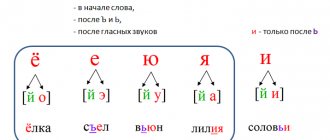Clarify the words: Russian language!
Newsletter closed
Upon closing, subscribers were transferred to the “Your Simple Business Assistant” mailing list, which we recommend that you subscribe to.
You can find mailings on similar topics in the Mailing Directory.
| September 2010 | ||||||
| 2 | 3 | 4 | 5 | |||
| 6 | 7 | 9 | 10 | 11 | 12 | |
| 13 | 14 | 16 | 17 | 18 | 19 | |
| 20 | 21 | 23 | 24 | 25 | 26 | |
| 27 | 28 | 29 | ||||
Author Easy Speak Courses
Statistics
1.977 subscribers +1 per week
- Issues
- Statistics
All episodes
What are one-syllable, two-syllable, three-syllable and four-syllable words?
Monosyllabic words are words consisting of one syllable and having only one vowel.
For example: house, stump, cat, look, current, hold, rain, bow, daughter, light, night, sickle, litter, cancer, nose, cheese. Disyllabic words are words that have two syllables and two vowels. For example: ar-buz, kar-man, ska-mya, zhu-ki, kuk-la, lu-na, tu-cha, rabbit-face, sha-ry, toad-ba, my-shi.
Trisyllabic words are words that have three syllables and three vowels. For example: mo-lo-ko, ko-ro-va, pro-sty-nya, do-ro-ga, kra-si-vy, ka-ran-dash, po-go-da, po-be-da, ka-bi-na, po-la-na, pi-ro-zhok, kra-pi-va.
Quadrisyllabic words are words that have four syllables and four vowels. For example: shah-ma-tist-ka, so-le-ni-e, na-zy-va-et, na-re-chi-e, for-da-ni-e, two-complex-e, ka-sa-ni-e, for-nya-ti-e, ke-ra-mi-ka, u-che-ni-tsa, mo-ni-to-ry, ba-ra-ba-ny, po- be-di-li.
Together with the article “What are one-syllable, two-syllable, three-syllable and four-syllable words?” read:
Source
What are monosyllabic words and how do they differ from other words?
Below we will talk about what monosyllabic words are, the rules for distinguishing them and using them, as well as what you should pay attention to when using such words in writing. For a clearer understanding of the essence of the issue, we will give examples of one-syllable, two-syllable and some other groups of words.
What are monosyllabic words
Monosyllabic words are words consisting of one vowel sound and one phonetic syllable. The number of consonants can be any.
A phonetic syllable refers to only one vowel in a word or a vowel in combination with one or more consonant sounds, which, when pronounced, are accompanied by one impulse of exhaled air.
The easiest way to explain to a child what monosyllabic words are is this. Invite him to place his palm under his chin and say, for example, the following words: peace, cheese, mouse, sleep, March, court, sport, look, hedgehog, bread. As you say each of these words, your chin will touch your palm once. This is the defining characteristic of a monosyllabic word.
In other words, such a word has only one stressed syllable - there is simply nowhere else for the stress to fall.
The use of monosyllabic words in written speech is subject to the rule. Such words cannot be transferred from one line to another, because they cannot be divided into syllables.
You can understand what monosyllabic words are based on the examples below. They can consist of one letter. These are the so-called “single-phonemic words”. There are few of them, and the most popular among them, of course, is the personal pronoun “I”. Other examples include the preposition “y”, the conjunctive conjunction “and”, the adversative conjunction “a” and interjections (a, o, e).
A relatively small number of monosyllabic words in the Russian language are represented by two letters. These are prepositions - on, for, in, before, from, by; nouns - as, il, hedgehog, mind, mustache; verb - eats, ate, eats; interjections - uh, oh, oh, ah, uff, fu, fi.
Quite often you can find words in which a vowel letter separates two consonants or is in a different position. Here are examples of three-letter monosyllabic words: without, me, you, two, hundred, cheese, litter, feast, steam, soap, mil, count, rice, tour, boom, zga, etc.
However, linguists claim that the largest number of monosyllabic words are words consisting of more than three letters.
Let us give examples of monosyllabic words consisting of four letters: growth, cheerful, boxing, fast, dispute, friend, frozen, steel, ill, smog, eye, raid, edge, moth, gat, darkness, early, etc.
The number of letters in a word should not be confused with the number of sounds: in the last four examples the number of consonants is two (the soft sign indicates the softness of the previous letter and cannot be considered a sound). You will find similar examples below.
We also remind you that the letter “th” is considered a consonant sound, since it cannot form a syllable.
But here are monosyllabic words with five or more letters: away, guest, steppe, sleeping, suddenly, back, really, glance, filter, Kremlin, passion, steal, etc.
Meaning
What does a one-syllable word mean? The complexity of a word is independent of the grammatical, morphological features of words, as well as their lexical meaning
Among the monosyllable words you can find:
- Nouns in the nominative and indirect cases (cheese - nominative case; strength - plural, gender case, darkness - darkness, darkness, etc.).
- Full and short forms of adjectives (angry - angry, rude, white, bald, dashing, etc.).
- Verbs (soaped, chalked, sang, howled, stood up, was, hide, etc.).
- Adverbs (in a big way, to the fullest, in the old days, far away, evil, sorry, in vain, etc.).
- Various pronouns (you, you, he, we, I - me; all, myself; what, how, than; two, three, no, this).
- Particles (at least, well, tea (colloquial), let, after all), as well as the interjections and prepositions already mentioned above.
Two-syllable and other polysyllabic words
According to the number of syllables, words can be, as can be understood from the name, two-syllable, three-syllable, four-syllable, etc.
To clearly explain this point, and to more clearly understand which words are called monosyllabic, you can use the same technique that was described above: when pronouncing two-syllable words, the chin will push the palm twice - as many times as there are syllables in a given word. In other words, there will be two pushes of exhaled air.
Two-syllable words contain two syllables: you-bya, me-nya, stup-pa, snake-ya, palm-don, friendship-ba, te-atr, just, came, shook, alloy, forest, etc.
Here are examples of three- and four-syllable words: tro-pin-ka, petty-ny, kra-si-vy, pro-stu-da, add-ba-vit, u-ka-zat, soar-ki-vat, rainy, zve-rush-ka, out-of-the-year, between-se-zon-e, dance-so-va-ya, ku-ka-re-kat, behind-mi- nat, etc.
Words formed with a suffix or prefix, including those written with a hyphen, are considered as a whole: somehow (two-syllable word), let's go (three-syllable), exactly (two-syllable), come on (two syllables).
Actually difficult words
Please note that in the Russian language there are so-called “compound words” - this is a group of words that contains two or more roots. Most often, these roots are combined into one word using connecting vowels (so-called “interfixes”) or they are written with a hyphen.
In both cases, they should be considered as solid formations, regardless of the number of roots with the help of which they were formed.
Let us give examples of such words: three hundred (two-syllable word, four consonants), airplane (three-syllable word, four consonants), somehow (three-syllable word, three consonants), wardrobe (three-syllable word, five consonants), etc.
Source: https://FB.ru/article/370650/chto-takoe-odnoslojnyie-slova-iv-chem-ih-otlichiya-ot-drugih-slov
What are monosyllabic words? Examples
Monosyllabic words are words that contain one vowel sound to form one syllable.
Let's find out what monosyllabic words are in Russian. A word can only have one vowel sound, which is a syllabic sound. Then we will indicate one phonetic syllable in it and call such a word monosyllabic.
Monosyllabic words are pronounced with one burst of exhaled air.
Such words can be indicated by only one letter, for example, the personal pronoun “I”.
A small number of words contain two letters, representing a vowel and a consonant.
Primeryad, ar, as (pilot), il, yur (an elevated place open to the winds), hedgehog, already, mind, mustache, yak.
In the Russian language there are a large number of monosyllabic words in which a vowel is sounded between two consonants.
Examples: selection, cube, tone, var, cancer, tick, whale, house, log, goal, peak, thief, mouth, current, mot, bar, count, dream, nose.
Depending on which vowel letter is written in the middle, we will give examples of monosyllabic words consisting of three, four, and even five letters. Individual monosyllabic words are written with six letters, one of which is a vowel and the rest are consonants.
Two-syllable words: examples
We suggest you complete the task suggested in the picture just above. Do it yourself, then check our options.
Two-syllable words: se-no, lu-na, Le-na, le-to, pi-rog, Se-na.
Here are examples of various options, presenting them in table form:
Source
Examples of monosyllabic words
With the vowel "a"
Tea, bar, steam, slave, varnish, manhole, hall, leopard, eye, frame, crab, king, flag, scarf, minced meat, farce, cartoon, waltz, stench, power, put.
With the vowel "o"
Side, horn, mot, cat, sweat, rock, juice, pain, board, pile, gnome, thunder, grotto, gloss, bridge, salt, haystack, drain, groan, bridge, growth, cable, rain, bone, nail, handful, bunch, reed.
With the vowel "u"
Beetle, bitch, bow, meadow, hum, mule, foot, liar, load, friend, club, rumor, knock, bush, chair, steering wheel, sack, pulse, ruble, scab, sadness.
With the vowel "i"
Tick, whale, rice, fox, face, world, feast, shooting range, bottom, breeze, cry, scream, leaf, pier, risk, drain, brush, creak, film, filter.
With the vowel "s"
Bull, smoke, cape, cheese, son, roar, owl, mouse, lynx, flush, shame, joint, meaning, wash away, whip, gnaw, hide.
With the vowel "e"
Sir, mayor, peer, el, hey.
According to the spelling rule, monosyllabic words are not transferred from one line to another, but are written entirely on it.
Source
Words can be called monosyllabic or polysyllabic, regardless of what part of speech they belong to: they can be nouns, adjectives, verbs, pronouns, and so on.
Difficulty identifying monosyllabic words
The main difficulty is that the same word in the singular and plural (tom - volumes, class - classes), when declined by case (luk - luka, house - house) can have a different number of syllables. For each of them, phonetic analysis is carried out individually.
Problems may also arise in words with a single vowel and several consonants. The number of the latter does not affect the number of syllables in any way.
Words with one closed or two open syllables can consist of an equal number of letters (table - frame). Here you need to follow the same principle, paying attention only to the vowels.
Complex words with two roots (closet, something, two hundred) are considered as a single whole. The number of roots does not affect the number of syllables; they are counted in general.
Definition of monosyllabic words
Units of speech that consist of one phonetic syllable and, accordingly, have only one syllabic vowel sound on which the stress falls, can be called monosyllabic. They may consist of:
It should be remembered that an open syllable ends with or consists of a syllabic sound (usually a vowel), and a closed syllable ends with a consonant sound.
Basics of syllabic structure
How to determine how many syllables are in a word? Their number is equal to the number of vowel sounds, which differ in that they can drag on: a-a-a, u-u-u, i-i-i. They are considered syllabic:
You will be interested: Gurba are noisy people: interpretation of the word and synonyms
What becomes obvious from this example? A vowel sound can form a syllable on its own (she-ya) or group one or even several consonants around itself:
Words that have only one vowel sound are called monosyllabic:
Examples are also presented in the picture below.
What if there are two sounds? These are two-syllable words, which are the focus of this article.
Polysyllabic options
If a word consists of two syllables, then it is disyllabic. In this case, it will invariably contain two vowel sounds, and it can be single and independent or surrounded by consonants: ya-kor, i-dol, seven-ya, u-dav, o-zon, o-buv, seven-ya .
Two-syllable words can consist of:
Each word can be mentally divided by a vertical line to see open and closed syllables in its composition: a-gent, e-not, spi-sok, vol-na.
The name of the term “three-syllable words” also speaks for itself: they contain three syllables (open or closed) and three vowel sounds. As in the case of disyllabic ones, a vowel sound can be either single or surrounded by several consonant sounds: o-go-rod, o-val-ny, u-slit-e, u-chi-tel, nek-ro-log .
When pronouncing, three impulses of exhaled air are made, but one of them is stronger due to the stressed vowel sound, and the other two are weaker in unstressed syllables. To correctly place emphasis on such words, it is recommended to use dictionaries that indicate their pronunciation.
Examples of three-syllable words: analysis, base, road, crow, dog, crown, candy, prefix, telephone, cheerful, run away, answer, mean, emphasize, buck.
What is a syllable, what are their types, how to divide words into syllables
So what is this - a syllable?
As you know, every word consists of syllables, which, in turn, consist of letters. However, for a combination of letters to be a syllable, it must contain one vowel, which in itself can form a syllable.
It is generally accepted that a syllable is the smallest pronounceable unit of speech or, more simply, a sound/sound combination pronounced in one exhalation. For example, the word “ya-blo-ko”.
To pronounce it, you need to exhale three times, which means that this word consists of three syllables. In our language, one syllable cannot contain more than one vowel. Therefore, the number of vowels in a word equals the number of syllables. Vowels are syllabic sounds (they create a syllable), while consonants are non-syllabic sounds (they cannot form a syllable).
Syllable theories
There are four theories trying to explain what a syllable is:
- Exhalation theory. One of the most ancient. According to it, the number of syllables in a word is equal to the number of exhalations made when pronouncing it.
- Acoustic theory. It implies that a syllable is a combination of sounds with high and low volume. The vowel is louder, so it is capable of both independently forming a syllable and attracting consonants to itself, like less loud sounds.
- Articulatory theory. In this theory, the syllable is presented as the result of muscle tension, which increases towards the vowel and decreases towards the consonant.
- Dynamic theory. Explains the syllable as a complex phenomenon, which is influenced by a number of factors listed in previous theories.
It is worth noting that each of the above theories has its own disadvantages, as well as advantages, and none of them has been able to fully characterize the nature of the concept “syllable”.
Types of syllables
A word can consist of a different number of syllables - from one or more. It all depends on the vowels, for example: “sleep” - one syllable, “sno-vi-de-ni-e” - five. According to this category, they are divided into monosyllabic and polysyllabic.
If a word contains more than one syllable, then one of them is stressed, and it is called stressed (when pronounced, it is distinguished by the length and strength of its sound), and all the others are unstressed.
Depending on what sound the syllable ends with, they are open (for a vowel) and closed (for a consonant). For example, the word “za-vod”. In this case, the first syllable is open because it ends with the vowel “a,” while the second is closed because it ends with the consonant “d.”
How to correctly separate words into syllables?
First of all, it is worth clarifying that the division of words into phonetic syllables does not always coincide with the division for transfer. So, according to the rules of transfer, one letter cannot be separated, even if it is a vowel and is a syllable.
However, if the word is divided into syllables, according to the rules of division, then a vowel not surrounded by consonants will form one full syllable.
For example: the word “yu-la” phonetically has two syllables, but when transferred, this word will not be separated.
As specified above, a word has exactly as many syllables as vowels. One vowel sound can act as a syllable, but if it contains more than one sound, then such a syllable will necessarily begin with a consonant. The above example - the word "yu-la" - is divided in this way, and not "yul-a". This example demonstrates how the second vowel “a” attracts the “l” to itself.
If there are several consonants in a row in the middle of a word, they belong to the next syllable. This rule applies to cases with the same consonants and to cases with different non-syllable sounds. The word “oh-ch-ya-ny” illustrates both options.
The letter “a” in the second syllable attracted a combination of different consonant letters - “tch”, and “y” - a double “nn”. There is one exception to this rule - for unpaired non-syllable sounds.
If the first in a letter combination is a voiced consonant (y, l, l, m, m, n, n, r', r), then it is separated along with the previous vowel. In the word “sklyanka” the letter “n” belongs to the first syllable, since it is an unpaired voiced consonant.
And in the previous example - “oh-cha-ya-ny” - “n” moved to the beginning of the next syllable, according to the general rule, since it was a paired sonorant.
Sometimes letter combinations of consonants in a letter mean several letters, but sound like one sound. In such cases, dividing the word into syllables and dividing for hyphenation will differ. Since the combination means one sound, these letters should not be separated when dividing them into syllables. However, when transferred, such letter combinations are separated.
For example, the word “i-zzho-ga” has three syllables, but when transferred, this word will be divided as “izzho-ga”. In addition to the letter combination “zzh”, pronounced as one long sound [zh:], this rule also applies to the combinations “tsya” / “tsya”, in which “ts” / “ts” sound like [ts].
For example, it is correct to divide “u-chi-tsya” without breaking “ts”, but when transferring it will be “learn-tsya”.
As noted in the previous section, a syllable can be open or closed. There are significantly fewer closed syllables in the Russian language. As a rule, they are found only at the end of the word: “ha-ker”. In rare cases, closed syllables may appear in the middle of a word, provided that the syllable ends in an unpaired sonorant: “sum-ka”, but “bud-dka”.
How to correctly separate words for hyphenation
Having dealt with the question of what a syllable is, what types there are, and how to divide into them, it is worth turning your attention to the rules of word hyphenation. Indeed, despite their external similarity, these two processes do not always lead to the same result.
When dividing a word for hyphenation, the same principles are used as when dividing it into syllables, but it is worth paying attention to a number of nuances.
It is strictly forbidden to tear off one letter from a word, even if it is a vowel forming a syllable. This prohibition also applies to the transfer of a group of consonants without a vowel, with a soft sign or th. For example, “a-ni-me” is divided into syllables like this, but it can only be transferred in this way: “ani-me”. As a result, when transferred, two syllables appear, although in reality there are three.
If two or more consonants are nearby, they can be divided at your discretion: “te-kstu-ra” or “tek-stu-ra”. When paired consonants are between vowels, they are separated, except when these letters are part of the root at the junction with a suffix or prefix: “class-sy”, but “class-ny”.
The same principle applies to the consonant at the end of the root of a word before a suffix - it is, of course, possible to tear off letters from the root when transferring, but it is not advisable: “Kyiv-skiy”. Similarly, with regard to the prefix: the last consonant included in its composition cannot be torn off: “under-crawl”.
Quadrisyllabic and other polysyllabic
Four-syllable words are defined using a similar principle: they contain four syllables and, accordingly, four vowel sounds, which, again, can be either independent single sounds or surrounded by several consonant sounds. During speech, four bursts of exhaled air are made. One of the syllables is necessarily stressed, while the rest remain unstressed and weaker.
Examples: kaleidoscope, ovation, collection, operator, fruitful, handsome, stool, semantics, rhetoric, catamaran, friendly, excellent student.
Depending on the number of syllables and vowels, words in Russian can be:
However, such long units of speech are not found so often in texts. In them, you need to count the number of vowels or mentally divide them with a vertical line into separate syllables in order to determine which group they belong to: u-prazh-ne-ni-e, sti-ho-tvo-re-ni-e, do - hundred-note-ness.
Letters and sounds of the Russian language
The Russian language has 33 letters and 42 sounds. Like letters, sounds come in vowels and consonants. There are only 6 vowel sounds (a, o, u, s, i, e) - they form 10 vowel letters (a, o, u, s, i, e, e, e, yu, i). All vowel sounds are divided into stressed and unstressed. There are 36 consonant sounds ([b] - [b']; [p] - [p']; [v] - [v']; [f] - [f']; [g] - [g']; [ k] - [k']; [d] - [d']; [t] - [t']; [zh]; [w]; [z] - [z']; [s] - [s' ]; [l] - [l']; [m] - [m']; [n] - [n']; [p] - [p']; [th']; [x] - [x' ]; [ts]; [h']; [w']) - they form 21 consonant letters (b, c, g, d, g, z, k, l, m, n, p, p, s, t , y, f, x, c, h, w, sch). Consonant sounds are hard and soft, voiced and voiceless. There are two more letters that do not denote sounds - the b sign and b sign.
This is interesting: original Russian words - examples and history of origin.
Transfer rules
Polysyllabic words, in contrast, are divided according to phonetic syllable division and, when written, can be transferred from one line to another. For example, this is how two-syllable words that contain open and closed syllables are translated: ru-ka, ko-sa, book-ga, may-ka, castle, ball-con, lar-chik, school-ny, book.
However, it should be noted that some two-syllable words have a cluster of consonants in the middle. They can be transferred both according to the phonetic syllable division, and by breaking up this combination of consonants, for example:
Sometimes one of the syllables of a two-syllable word consists of a single syllabic vowel: I-measles, i-va, o-sen, i-ris, o-zon, o-buv, u-pal, u-dav. In these cases, a single vowel cannot be separated and left on the line. The word is written in its entirety and is not transferred.
According to the same rule, when writing, three-syllable, four-syllable words, etc. are transferred. They are divided according to the phonetic syllable division: bo-ro-da, do-ro-ga, kra-so-ta, te-le-fon, vzglya-dy- wow, ta-bu-ret-ka, ka-ta-ma-ran, ma-te-ma-ti-ka, che-lo-ve-honest. But if the vowel forms an independent syllable, orthographic transfer does not coincide with phonetic syllable division:
| Phonetic syllable division | Correct spelling |
| u-gap-e | gorge |
| teacher | teacher |
| garden | garden |
| destination | destination |
| stop | stop |
| ovation | ovation |
| u-chi-li-sche | teacher |
Thus, when transferring polysyllabic words, it is important to carefully ensure that single syllabic vowels do not remain on the line separated from the rest of the word: this is contrary to the rules of spelling of the Russian language.
Source
Dividing words into syllables
A vowel sound or a combination of a vowel sound with consonant sounds grouped around it, pronounced with one impulse of exhaled air, is called a phonetic syllable . However, you need to remember that the phonetic syllable and the syllable for transfer may not be the same. For example, according to the rules of word hyphenation, you cannot leave one letter on the line and hyphenate it (battery-ray, not battery-ya).
It is vowel sounds that are syllabic, so a word has as many syllables as there are vowel sounds:
- Stack;
- Wall;
- Beard;
- Mess;
- A-ka-de-mi-ya;
- Goodness;
- Autobiography;
- Ver-ro-is-po-ve-yes-no;
- E-lek-tro-o-bes-ne-che-ni-e;
- Man-of-nothing.
Monosyllabic words are words that have only one vowel sound and, accordingly, only one phonetic syllable.
This is interesting: “seven spans in the forehead” is the meaning of the phraseological unit.
Examples of monosyllabic words
Monosyllabic words consist of:
- From one letter: I (personal pronoun), a, and (conjunctions), o, u (prepositions).
- Made up of two letters representing a consonant and a vowel. For example: hell, as, ar, hedgehog, pa, us, mind, already, cabbage soup, south, yak, poison, yar.
- Of three letters in which a vowel is located between two consonants. For example: run, encore, ball, bass, fight, forest, bull, side, ox, thief, cart, year, rumble, goal, guide, gift, house, valley, oak, smoke, shower, spruce, heat, beetle, hall, tooth, itch, pharynx, call, iodine, cat, whale, cook, stake, cube, lump, ice, varnish, hatch, fret, forest, lion, fox, forehead, meadow, flax, bow, ray, myth, chalk, magician, cape, fur, sir, mayor, honey, world, moment, poppy, ball, husband, sword, nose, bottom, knife, sweat, dog, pud, pop, pass, steam, mouth, horn, rock, rum, roar, cancer, slave, row, rice, roar, soup, court, dream, catfish, son, cheese, owl, bitch, juice, litter, basin, current, tick, tom, tone, round, hairdryer, background, foot, face, chorus, hour, tea, check, jester, noise, ball, step, jester, shock, shield.
- From four letters : pain, damn it, brother, true story, riot, borscht, block, breeze, leopard, bow, bandage, bolt, point, board, screw, doctor, liar, wolf, enemy, loach, pile, goose, hump, coffin, coat of arms, cargo, grotto, eye, gnome, makeup, thunder, mushroom, anger, hail, day, daughter, friend, disk, gesture, umbrella, ringing, bison, snake, glue, circle, beak, hook, key, whip, fang, cream, mole, carp, crane, crown, treasure, maple, crab, frame, horse, club, cry, bush, clone, clan, wedge, cry, laziness, doe, leaf, elk, bridge, fruit drink, darkness, mouse, ointment, walrus, meter, March, mother, brain, thread, night, zero, beach, post, plaid, port, stump, park, fruit, start, cloak, plus, pond, pilaf, lynx, growth, rhythm, risk, army, early, steering wheel, role, salt, groan, stan, joint, stack, shame, knock, drain, laughter, slope, chair, table, drain, elephant, syllable, trace, snow, light, tulle, test, tank, tact, hold, shadow, trick, cake, darkness, toast, throne, cable, darkness, felt, flag, stuffing, farce, fleet, bread, stable, chrome, snoring, color, chain, king, goal, circus, nonsense, charm, cartoon, scar, scarf, chance, closet, pole, shawl, silk, crack, click.
- From five letters : shine, abuse, form, brooch, eyebrow, brand, cry, waltz, takeoff, hacking, nonsense, leader, news, contribution, platoon, explosion, branch, entry, depth, gram, edge, dirt, guest, flu, grill, soil, wilderness, Gzhel, grant, door, trembling, rain, shot, double, blackbird, drill, life, beast, cross, bone, cross, blood, brush, prince, class, flattery, thought, revenge, oil, remote control, whip, pulse, press, mouth, splash, reservoir, prince, ruble, mercury, rail, warehouse, pillar, steppe, sense, review, swift, tornado, demand, skunk, mixture, alloy, arrogance, scotch tape, steel, start, sport, stand, build, fear, slime, style, scrub, creaking, whistle, congress, connection, trunk, trill, timbre, fabric, father-in-law, crackling, film, flank, queen, fruit, crunch, canvas, whip, tail, hop, center, worm, part, squall, fine, bumblebee, calm, storm, storm, stamp, stroke, syringe, hose, front.
- From six letters : look, squeal, sob, cry, power, sadness, nail, handful, bunch, milk mushroom, anger, flatterer, monster, sorrow, scalp, stress, sweetness, cane, filter, wool.
This is interesting: what questions does the adverb answer, how is it classified?
Monosyllabic words are... Examples
Monosyllabic words contain
Let's find out what monosyllabic words are. A word can only have one vowel sound, which is a syllabic sound. Then we will indicate one phonetic syllable in it and call such a word monosyllabic.
Monosyllabic words can consist of only one letter, for example, the personal pronoun “I”.
A small number of words contain two letters representing a vowel and a consonant, for example:
hell, ar, as (pilot), il, yur (an elevated place open to the winds), hedgehog, already, mind, mustache, yak.
There are a large number of monosyllabic words in which a vowel sounds between two consonants:
bor, cube, tone, var, cancer, tick, whale, house, log, goal, peak.
Depending on which letter is written in the middle, we will give examples of monosyllabic words consisting of three, four, and even five letters. Individual monosyllabic words are written with six letters, one of which is a vowel and the rest are consonants.
What parts of speech words can be monosyllabic?
Monosyllabic words can be found among different parts of speech, for example:
- Short adjectives: al, lethargic, quiet, young.
- Verbs: sleep, reap, wait, throw, take out.
- Numerals: two, three, five, one hundred.
- Interjections: ah, oh, oh.
- Particles: no, yes, li.
- Prepositions: for, under, on.
It often happens that the initial form of a word is polysyllabic, and one of the forms is monosyllabic. For example, here is the verb “throw” - it has two syllables, because there are two vowels: O and I. And in the form of the imperative mood, this verb has a monosyllabic form: “throw” - one vowel O, one syllable.
Examples of monosyllabic words
With the vowel "a"
Tea, bar, steam, slave, varnish, manhole, hall, leopard, eye, frame, crab, king, flag, scarf, minced meat, farce, cartoon, waltz, stench, power, put.
With the vowel "o"
Side, horn, mot, cat, sweat, rock, juice, pain, board, pile, gnome, thunder, grotto, gloss, bridge, salt, haystack, drain, groan, bridge, growth, cable, rain, bone, nail, handful, bunch, reed.
With the vowel "u"
Beetle, bitch, bow, meadow, hum, mule, foot, liar, load, friend, club, rumor, knock, bush, chair, steering wheel, sack, pulse, ruble, scab, sadness.
With the vowel "i"
Tick, whale, rice, fox, face, world, feast, shooting range, bottom, breeze, cry, scream, leaf, pier, risk, drain, brush, creak, film, filter.
With the vowel "s"
Bull, smoke, cape, cheese, son, roar, owl, mouse, lynx, flush, shame, joint, meaning, wash away, whip, gnaw, hide.
With the vowel "e"
Sir, mayor, peer, el, hey.
According to the spelling rule, monosyllabic words are not transferred from one line to another, but are written entirely on it.
Monosyllabic words
Based on the minimum number of vowels in a word, we select monosyllabic words that contain one phonetic syllable. Let's remember what a phonetic syllable is.
A phonetic syllable is one vowel sound or a vowel combined with one or more consonant sounds, which in the process of speaking are pronounced with one impulse of exhaled air.
Place your palm under your chin and clearly pronounce the words:
manhole, march, elk, bridge, leaf, moment, cheese, test, look.
On vowels, the chin will hit the palm once. This means that these words are monosyllabic.
Let's learn in more detail about the composition of monosyllabic words with one, two, three, four consonants.
How to do morphemic analysis of monosyllabic words
Usually in monosyllabic words the entire word is the root. For example: dirt, path, house, nail.
If the word is changeable, then it will also have a zero ending, for example, house - houseA. The word "house" has a zero ending.
However. My advice to you. Never highlight the entire word as a root, justifying this by the fact that the word is monosyllabic. For two reasons:
- You may be wrong.
- The teacher will not accept such an explanation.
Let's say you understand the word “congress”. It is monosyllabic because it has only one vowel – “e”. However, in this word there are three morphemes: “s” is a prefix, “ezd” is a root, and a zero ending. Why? Because there is a word “riding”, “ride”.
So be sure to check yourself, choose words with the same root. And if you are doing homework, after parsing the word, check whether you have identified the morphemes correctly in the reference book. Well, or in Yandex/Google, if you don’t have a reference book at hand.
Two-syllable words
According to the number of syllables, words can be polysyllabic: two-, three-, four-syllable, etc.
Two-syllable words, as can be determined by their name, contain two vowel sounds, for example:
sli-va, chair-chick, fence, city, crown, te-ma, u-kaz, island, a-gent, i-gla, snake-ya, evening.
When pronouncing them, the chin will fall onto the palm twice, as there will be two shocks of exhaled air.
We will learn about how to divide words into phonetic syllables and what needs to be taken into account with examples in the article about two-syllable words.
Not all two-syllable words can be transferred from one line to another in accordance with phonetic syllable division. A number of words in which a single vowel forms an independent syllable cannot be transferred, leaving one letter on the line, for example:
Four syllable words
If the sound form of a word contains four syllabic vowels, we will call it four-syllable, for example:
- a-za-li-ya, a-lu-mi-niy, a-ra-be-ska;
- ka-ley-do-skop, rat-so-lo-vka, hundred-ro-zhe-howling, le-ni-vi-tsa;
- o-sta-no-vka, o-va-tsi-ya, o-pe-ra-tor;
- u-chi-li-sche, u-kla-dchi-tsa, u-ro-zha-ny.
The transference of these words also requires care. When translating four-syllable words, one letter cannot be left on the line or transferred to the next line, although the phonetic syllable exists independently in it.
Let's compare:
- u-ro-zhay-ny - harvest-y, fruitful;
- o-va-tsi-ya - ova-tsiya;
- a-lu-mi-niy - aluminium-minium, aluminum-niy.
Four-syllable words are not the limit in phonetic composition. In the Russian language there are five-, six-, seven-syllables, etc. words, for example:
- five-syllables - u-kra-she-ni-e, for-ya-vle-ni-e, ma-te-ma-ti-ka, fur-ha-ni-che-sky;
- six-syllables - pre-o-bla-da-ni-e, po-be-di-tel-ni-tsa, per-re-po-ya-sa-ny, po-la-ri-za-tsi-ya;
- seven-syllables - mi-ne-ra-liza-tsi-ya, with-so-e-di-ne-ni-e, re-ko-gno-sci-ro-vo-chny.
Previous
Hyphenation of wordsDisyllabic words are... Division into syllables (examples)
Next
Hyphenation of words Which words cannot be divided for hyphenation?
Three syllable words
A word can have more vowels than two. Three vowel sounds combined with consonants form three-syllable words. When pronouncing a three-syllable word, three impulses of air occur, but one of them is stronger, which is created by the stressed vowel, and two are weaker in unstressed syllables. Let's make sure of this by saying the words:
l e -tchi-tsa, k-r about -va , white-li-zn a .
Examples of three-syllable words
In three-syllable words, consonants are grouped with vowels with two, three or even four sounds per syllable, for example:
A vowel can form an independent syllable in a three-syllable word:
Please note that the orthographic transfer of the words given above does not coincide with their syllable division due to the presence of a single vowel in their sound composition.
Let's learn the rule of word hyphenation in Russian.
Let's compare phonetic syllable division and orthographic hyphenation of words:
Meaning
What does a one-syllable word mean? The complexity of a word is independent of the grammatical, morphological features of words, as well as their lexical meaning
Among the monosyllable words you can find:
- Nouns in the nominative and indirect cases (cheese - nominative case; strength - plural, gender case, darkness - darkness, darkness, etc.).
- Full and short forms of adjectives (angry - angry, rude, white, bald, dashing, etc.).
- Verbs (soaped, chalked, sang, howled, stood up, was, hide, etc.).
- Adverbs (in a big way, to the fullest, in the old days, far away, evil, sorry, in vain, etc.).
- Various pronouns (you, you, he, we, I - me; all, myself; what, how, than; two, three, no, this).
- Particles (at least, well, tea (colloquial), let, after all), as well as the interjections and prepositions already mentioned above.
